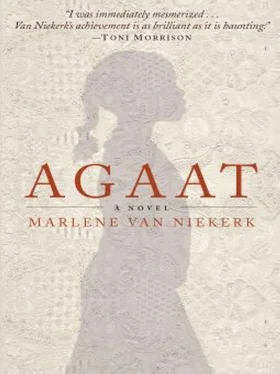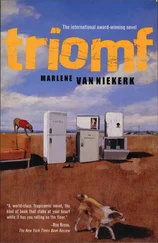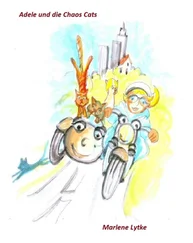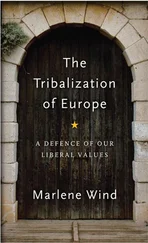You folded the wings of the mirror so that in the morning the damage to the central panel would not be visible.
The bigger you grew with child the more time Jak spent on his appearance. He became fastidious about what he ate, combinations of certain foods at certain times, power supplements that stood around in tins in the kitchen. You couldn’t keep up with cooking what he wanted and the servants understood nothing of it.
Then cook your own food, you said, and so he ate nothing but raw grated vegetables and macaroni. Every night before coming to bed he trained with his weights in the stoep room. Every morning and every evening he went for long runs in the mountains and almost every weekend since you fell pregnant he went off to take part in tennis tournaments or races. He became the Overberg long-distance champion and the Tradouw’s prime mountaineer. His only responsibility towards the world, he seemed to think, was that he shouldn’t get fat, that he shouldn’t with time come to seem coarse and heavy like most other farmers. His only bailiff was his stop-watch, his only judge the bathroom scale.
His achievements he displayed all around him. He kept the maps of Grootmoedersdrift in his new stoep room. If he could have lifted his leg like a fox terrier, he might have had his way with them. There they hung surrounded by his shelves full of trophies and mounted medals with ribbons in display cases, amongst his photos of himself.
The photos in themselves constituted a whole history of one man’s vanity.
Jak on graduation day in his gown, Jak at Elsenburg with the agriculture students’ athletics team. Jak with his first sheaf of short-stem wheat, Jak with the agent next to the new combine, with a glass of wine in his hand at the regional caucus of the NP, Jak on his Arab mare, booted and spurred for a horserace, Jak at a farmer’s day in his white clothes, leaning against his first red open sports car, Jak in close-up, in a studio portrait, brilliantined hair, smoothed back, charming Jak de Wet, the gentleman farmer. A dead ringer for Gregory Peck, as your mother used to say.
In the time of the fixing up of the new rooms you got into the habit of going into Jak’s office when he wasn’t there. Who is this beautiful man? you wondered. What has he got in him? Nobody can be so beautiful from the outside and so hollow from inside. Not even in a third-rate novel. When is he going to reveal himself? When is he going to show who he really is? You could tell that he was brooding on something, but what?
Over and over again you looked at the display, picked up all the trophies and read the inscriptions, removed the medals with their satin ribbons from the glass cabinets and weighed them in your hand, examined the photos from up close, touched all his strange hard apparatus and reins and harnesses, fastened and unfastened the buckles and belts, tried to budge the weights, smelt and tested the powders and oils between your fingers.
Perhaps there were other reasons for these sessions. If Jak, indeed if anybody, had had to see you in his room, they would have imagined that you were feasting on his fame.
That may be what Beatrice thought when she found you there one day. You hadn’t heard her approach. Then she saw you there in front of the photos, came and stood next to you, and produced a sigh, cunningly, now you think back on it.
Ai, Milla, what a wonderful man you married, if only Thys were like him.
You played along for a while.
What’s wrong with Thys? you asked, he looks like a real pillar of strength to me.
Thys, he, he is. . hard.
But with you? you asked, with you he is surely soft?
Beatrice looked away.
What got into you? Did you want to shock her? Perhaps you thought your pregnancy gave you licence, gave you power, liberty to be open-hearted.
Pretty Jak de Wet is a dog, Beatrice, you said. A Doberman if you like, fine of build with a beautiful muzzle, but a dog nevertheless.
Then you told her about Jak, about how he treated you. She listened.
You told her everything about the painting of the cabinets and the dragging across the cement and the scratches and the bruises and how it had gone on over the years, and how he had withdrawn into himself, a time-bomb waiting to explode. She’d always thought there was something wrong, she said. The more you told, the less she wanted to hear, but you kept her there.
Why did I marry him, Beatrice? you asked, who is this man? The more I stare at these photos to try and understand, the more the mystery deepens.
Perhaps, Beatrice began, you could see she was hesitant, perhaps you wanted to share in his. . in his. .
Beatrice looked away. You waited for her to continue.
Perhaps you’re dependent on his. .
She took her handbag, left her sentence hanging in the air. You changed the subject.
No, you said, don’t go yet, it’s your turn now, you talk to me now, I also guess my guesses about you, you know.
And then you saw it, how she clammed shut, how the defensiveness came over her, over her mouth and into her eyes. More than defensiveness, disgust, judgement. Of you, not of Jak.
I shall never talk out of the house, Milla. Marriage is holy and it’s private. Everything depends on that. Thys has his faults but he’s a good human being, a good man, and I stand by him through thick and thin, as I promised before the holy Lord.
On her heel she turned and walked out. You went and sat on a chair there in Jak’s room, in his display case, as if his displayed wares had to forgive you for what you’d let out of the bag. What dark mood was it that drove you out of there? You took his camera that was lying on his desk, and went looking for him.
You found him in the implement shed with the new ripper. You walked across the yard slowly, your body was big, it was a month before Jakkie’s arrival. The plough had been delivered that very morning by the agent of International Harvester. You had a good reason to go and look for him because lunch was on the table. The shed was dark, you stood still for your eyes to adjust. Jak was standing caressing the seed hopper of the new plough. His lips were moving.
Soilmaster, you heard him say. The word sounded clearly in the shed. He squatted into the backside of the plough, his eyes closed while he played his hands up and down over the teeth.
You wanted to turn away and leave, you held the camera behind your back, but he’d already seen you.
Milla, he called after you.
Come and eat, you wanted to say, but then you said something else.
Then you said to him, move the plough out under the wild fig, I want to take photos. And you walked back to the house with your heart filled with dark feelings and you paged through his wardrobe until you found an olive-green shirt.
This will show off the red of the plough more clearly, you said, they’re complementary colours, red and green.
And then you posed him, like this and like that, and you aimed from below and from above, from near and from far, full and half and quarter profiles.
Smile, you said. Pensive. Say cheese, sing, happy days are here again, sing, I talk to the trees.
The farm kids also wanted to be in the photos. They swarmed all over the plough like bats and fiddled and fidgeted everywhere as if they might find something edible there. And then Jak said abruptly, that’s enough, he was tired now. Certainly the first time that you’d heard him say that of a photo session.
When at last you were seated at table, he looked at you, pale-faced, said he felt terribly exhausted, he hoped it wasn’t his heart, and then went to lie down without eating.
You sat there for a long time over the cold food, a taste of iron in your mouth.

Читать дальше













